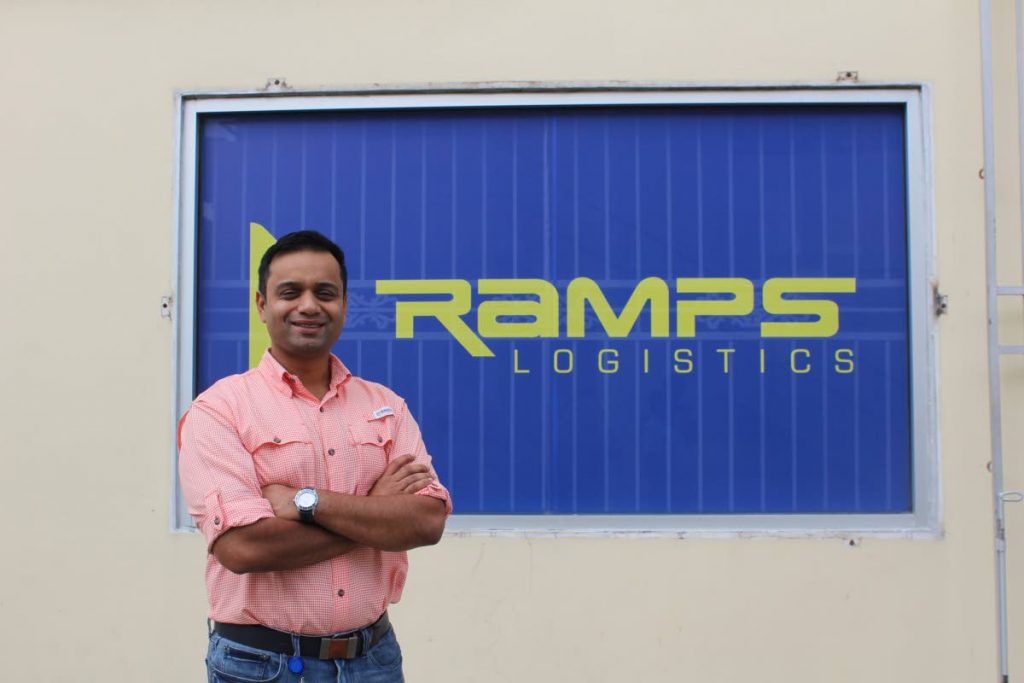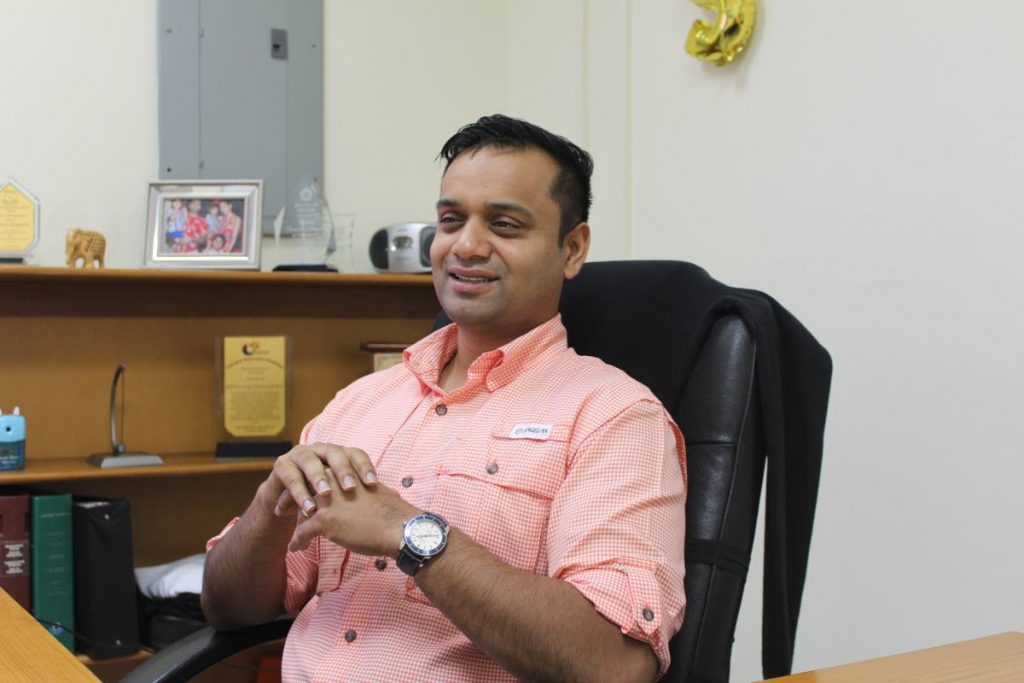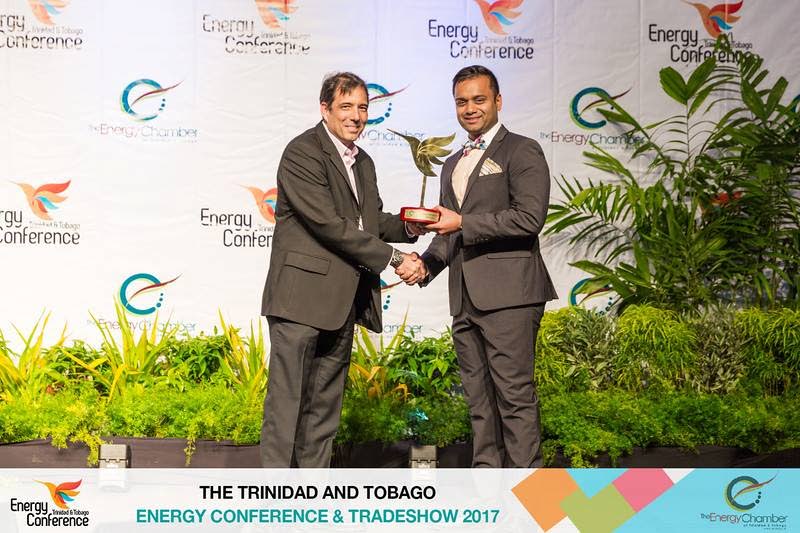Raising the stakes

Shaun Rampersad has a single-minded vision for his family company – to make Ramps Logistics Ltd one of the best-known, most-trusted and well-loved brands in the Caribbean.
“The whole idea is to build a brand that people want to be associated with, a brand that stands for something, so we are very particular – of course you want to make money – the number one purpose of a business is to make money so in order to do all the good stuff you have to be profitable too. Profit should drive good. Businesses should exist for the betterment of society – and we are particularly concerned about the societies in the Caribbean. I think the strength of a country is the strength of the brands in that country,” Rampersad told Business Day in a recent interview at the company’s home base in Cunupia.

Since joining the company in 2003, he’s been a tour de force in the industry, turning what was simply a small customs brokerage firm started by his father, Ramnarine, in 1985, into a compact powerhouse that can compete – and win – major logistics contracts from some of the biggest companies in the world. From a small office in Port of Spain, Ramps now has operations in Trinidad (its headquarters), Guyana, Suriname, Houston, and soon, Mexico, and has nearly 400 employees.
“My dad actually told me don’t come into the business,” Rampersad laughed, as he recalled how different it was back then. He joined soon after graduating from the University of the West Indies St Augustine with a degree in industrial engineering. “When I joined the business, it was different — just really dad alone and ten other people (all of whom still work for the company). We were only doing customs work, then.”
He stepped in and implemented some changes. First was expanding the company’s services.
Ramps is an integrated logistics company. It provides shore-based management, freight forwarding, work permit applications and customs brokering. “Logistics is ensuring you have the right assets in the right place at the right time to get the job done safely. So that’s what we do, we make sure that the right people, the right equipment and the right assets are always in the right place, whether that place is in Houston or Guyana or Trinidad or Suriname,” Rampersad said.
What the company does, then, is cut through the red tape of bureaucracy so their clients don’t have to.
“A huge part of manufacturing (raw materials) comes from outside TT. Every time you cross an international border you have to deal with red tape – customs, duties, taxes and delays to the supply chain. Just the red tape introduces a significantly higher risk and cost to doing business so it’s a lot harder starting and developing a business in the Caribbean than it is in a developed and integrated market like the US. Logistics is a big part of cutting that cost and improving planning because there’s better visibility along the supply chain.”

Among the company’s clients in Trinidad are Unicomer (the parent company of furniture retailer, Courts) and Atlantic, but Ramps is happy to work with smaller customers.
“Logistics is a big part of your cost of doing business in the Caribbean so if we can help people, regardless of the size of their business, reduce that logistics costs and improve the process then we can help build bigger and better businesses,” Rampersad said.
The company’s biggest client so far, though, is ExxonMobil. Ramps handles the all the oil giant’s shore-based logistics for its Guyana exploration and production operations. For a tiny company from a tiny country, it was a major breakthrough.
Guyana glory
Snagging the Exxon contract wasn’t just by chance – it was all part of a strategic expansion process that began in earnest in 2012, when the company made its first foray overseas into Haiti.
“We knew how much we wanted to grow but we knew TT alone as a market couldn’t sustain that rate.” The obvious thing then would be to look for high growth prospects. The problem with that, he said, was that everybody would have the same idea and rush into a market to try to get there first. So, Ramps tweaked its strategy. “We did an analysis with a mix of high growth and high-risk possibilities, so the high risk keeps out the majority of players. And we figured, you know if you compare us to an American or European company, we grew up in the Caribbean so we know how to manage risk. So, we looked at a very risky business in Haiti, found a joint venture partner and did very well there for a long time and it helped us to understand how to do business in another market.”

Next up was Guyana. “We’ve been in Guyana since 2014. It’s a funny story. People always ask me what was the research I did to go into Guyana. I just know I wanted to go to Guyana.”
The breakthrough came while he was discussion the option with his senior managers. One of his managers, he recalled, had just got out of a relationship and was looking to get far away from Trinidad. “She said, ‘Shaun. You always say you want to go Guyana. Why not just go. I’ll set up the office.” And that was that.
This was long before any prospect of oil, he said, and the company had just six clients. But they were there. A few months later, one of Ramps’ partners in Houston called him up and to talk about a potential client. “He said they were doing some prospecting for oil, and it was just one well. They didn’t even think they’d find anything in that well.”
That client ended up being ExxonMobil and that one well turned out to be Liza 1 – the start of one of the biggest new oil finds in the world in recent years.

“After that exploration well, Exxon closed up shop because they had to evaluate their data. Then in about October 2015, they told us they were going to do a global tender, and invited us to be part of it. We didn’t expect to win but we did and that was our first international tender — to do shore-based customs and freight. It was one of the most integrated oil and gas tenders in the world and a pretty large one too. Not just for TT standards but global.”
Now the challenge was execution. “Of course, we didn’t know exactly how to do it and we couldn’t afford to hire Brits or Americans. But then we thought, where could you find world-class oil and gas professionals at a fraction of the price? Venezuela.”
The work permit process was arduous (even for a company that facilitates them as one of their services). The company hired some professionals from Venezuelan state oil company PDVSA, who trained the Ramps team, to the point where Exxon was so pleased with the work that they offered the company the chance to tender again for another logistics contracts for five years – which they also won. That guaranteed source of cash flow gives Ramps some leeway to expand even more.
The company has won other contracts too – with UK oil company Tullow for logistics in Suriname and just last week, for Guyana. It has also lost some. Rampersad said the company was invited to bid on a contract from Shell in TT, but even though it lost, he was grateful for the feedback. "They told us we were good and they liked us, but they wanted someone with more experience. I think we have enough experience, but I appreciate the feedback but I know when that contract comes back around, we’ll be ready for them.”
Young, bright and eager
Rampersad is proud of his team, because everybody works hard to ensure that the company maintains a reputation for service delivery that is comparable to the biggest and best in the industry.
“What we do on the shore-based side, not a single other local company has been able to enter that space. It’s been run by Asco and Peterson. One is Dutch and the other British. I think Caribbean people you can’t just be as good as the (foreign companies). You have to be twice as good to get the same level of respect. My job is not to figure out why that happens. It’s to make sure I am two times better. We go with the philosophy — especially with Exxon – that if we get the chance we can blow (the competition) out of the water.”
He also has a young team. Rampersad himself is 37, and joked that at the last management retreat he, and his father were the oldest in the room. There’s also a significant number of women in management positions.
“It’s not something we consciously set out to do. I feel proud of it. I don’t think you can consciously hire for diversity but instead, you should create an atmosphere that attracts talent. When we find good people, even if we can’t find a position for them we will still bring them in because we knew we can always find a way to get a return on that investment. Your biggest asset is your people. We just created the right atmosphere and talent came to us.”
It’s part of the company’s branding and corporate culture, one that’s very open to sharing information, and also very strong on corporate social responsibility.
“We think millennials aspire not just for a paycheck but a sense of personal satisfaction that they are doing something that in some way is helping to improve the society. Ramps is also the kind of place that, within the first week, you know if you’re going to fit in or not. People might leave after the first month or stay for a very long time but we’ve been able to attract a lot of bright young people.”
Rampersad’s goal is to create a brand that people want to work for. “How do you put all these things together and build a brand that people recognise and love – especially young people. We have to provide them with a standard of living comparable or better than (multinationals), but the one thing a Caribbean brand can provide that no other can is a sense of pride. We’ve seen people give up bigger jobs to come work for us because they want to come build something. We are very focused on building something and improving the quality of life around us. And to do that we have to be damned good at what we do.”

Comments
"Raising the stakes"